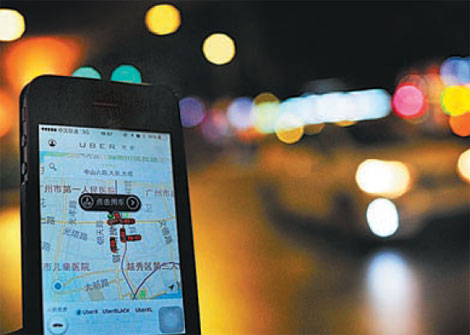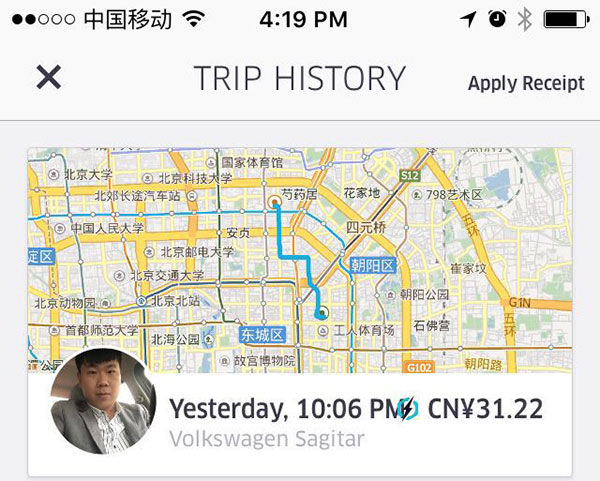 |
|
The car-hailing mobile app of Uber Technologies Inc. Provided to China Daily |
In the acclaimed BBC series Sherlock, a cabbie turns out to be the serial killer in the first episode, the person you least suspect because he's "just the back of a head" to his passenger.
However, when I take a ride on Uber or Didi on my trips around Beijing, I often try to make an effort to have a conversation with the driver - to get some sense of the people that literally drive the two car-hailing juggernauts.
Of course, I try to push the "possible serial killer" thought to the back of my mind, and usually that's pretty easy, since I've rarely had any bad experiences with my drivers.
 |
|
A screen grab shows the interface of Uber. |
The typical Uber or Didi driver in Beijing is a middle-aged Chinese man with short-cropped, un-trendy hair, and usually grew up somewhere other than Beijing. Most of them have been here an average of ten years.
They usually drive a Volkswagen or a Buick or a Toyota, although on one glorious ride I was picked up in a Tesla that moved impossibly silently down Beijing's ring roads, while I questioned its shrunken-faced driver about how he recharged his vehicle (there are stations where you can do so).
What interested me about these men, who seem to be pretty well off - they have at least enough to afford a car - was a strain of nostalgia for their hometowns that ran through their conversations, despite the fact that they were clearly financially better off today.
This was theme that kept cropping up, no matter where they were from - Henan, Shanxi, Shandong. I traced the familiar, expected pattern of rural-urban migration from a farming village to the big smoke, the metropolis, the capital, and the attendant losses that came along with it.
"When I was young, Spring Festival was so exciting. It was the best time of the whole year," said Liang, from Hebei. "It was the only time in the year we got new clothes. Now we can buy new clothes any time, we can eat whatever we like anytime. The new year has become almost meaningless," he said.
Curiously, inherent in his statement was an acknowledgement that life had gotten better - he could buy those new clothes, those special new year foods year round, now, whereas they were rare in his childhood. Yet, it was the very poverty he had escaped that made those things special. They gave him a feeling that mass consumerism cannot now provide.
 |
|
A screen grab shows driver Zhu, his plate number, his car type, orders he has taken via Didi, and the credit he gets from passengers. |
"There is nothing like the moon when it was full in my village," said Zhu, who grew up in a farming family in Henan. "It was so bright in the sky that when you looked down the road you could see all the grass by the wayside. I just don't get that feeling anymore."
We were trying to catch a glimpse of the moon in the sky on that smoggy Beijing night, a difficult thing since it was constantly obscured by the tall buildings surrounding us, and dimmed by the myriad lights of the city. "When we ate soybeans by the light of the moon after cooking them over the fire, they were the sweetest things in the world," Zhu continued. "I don't know how to find such soybeans anymore."
Here he was, in the capital of a rising China, behind the wheel of a Roewe and capable of earning 20,000 yuan a month on a good month driving it. He has his own house and car, a wife and kid, but somehow something has been lost in the move from hometown to capital, from poverty to the middle class.
Being from Singapore, which was growing at the rate China does now in the 80s, I was not too surprised by this strain of nostalgia, because it is one I have seen in my own culture in the face of development.
Whether it was poets bemoaning the clean up of the Singapore River (which had a legendary stink from the pollution) as "losing its soul", or painters resolutely depicting the attap huts of villages which have all but vanished from the island, our art reflected a need to memorialize and honor the things being swallowed up by modernity.
We are simply seeing the same phenomenon in China, which changes at such a break-neck pace that sometimes, it exceeds the human capacity to fully comprehend. Just because we are intellectually able to adapt to modernity and technology does not necessarily mean we are emotionally able to process it.
But perhaps the drivers' sentiments are also part of the age-old human predilection for viewing the past through rose-colored lenses - a normal part of an aging person's nostalgia for their youth, no matter what the circumstances.
"My life now is just about earning more money," says Zhu with a sigh. "We were so carefree then - the moon of our youth is the best moon."
